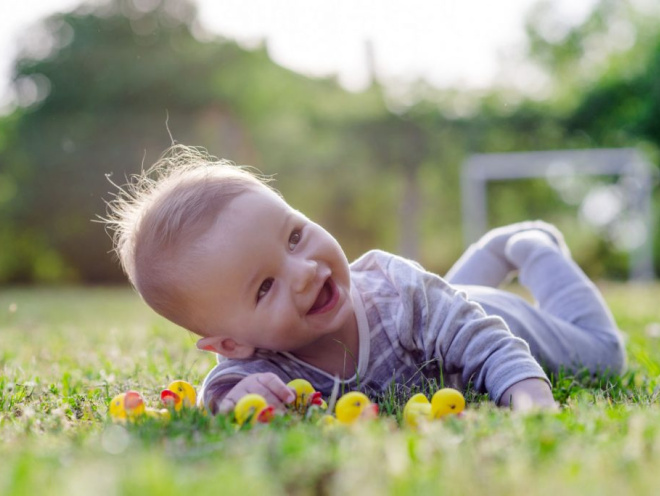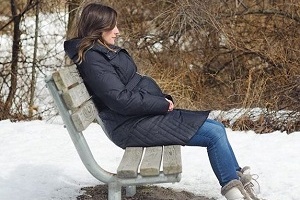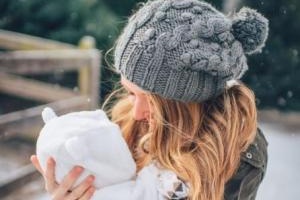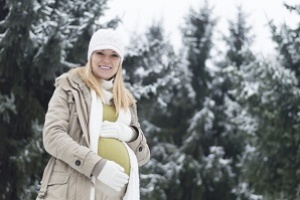There’s no denying there’ll be some differences to your experience of having and looking after a baby depending on the season. Find out more...
Birth
The thought of going into labour when it’s snowing and you need to get to hospital NOW can be a worry to parents who are expecting a winter baby.
Don’t worry too much though, as in the UK it’s very unlikely you’d be completely snowed in. Yes, it has happened, but usually in very remote areas (and the odd Hollywood movie!) All the same, it’s a good idea for your birth partner to refresh their knowledge of driving in snow or icy conditions and make sure wipers and tyres are up to the job (RAC 2019).
At the other end of the spectrum, parents preparing for summer births should bear in mind that hospitals can be very warm. If it’s a hot day outside, it may get even hotter in your room or ward. Consider packing things to keep you cool in your hospital bag, such as a handheld fan or water spray (NHS 2018a) and loose clothes. Keep drinking plenty of fluids to stay hydrated.
Newborns
Sleep
It’s never great to be woken at 4.30am, but it’s much easier to get up for a feed (or let’s face it, for the day) when the sun is shining outside. Parents of summer-born babies tell us that the extra daylight can make them feel more energetic after a sleepless night. Bonus.
The flip side is the early morning rays waking you and your little one up, or trying to get your baby to sleep when the sun is blazing through the curtains. Your baby should sleep in the room with you for the first six months (The Lullaby Trust 2019a). So for both your benefit, you might want to invest in a good set of curtains or blind (NHS 2018b).
In the winter, enjoy getting cosy with your new baby in those snuggly newborn months. However, it can be slightly disorientating going for a mid-afternoon nap with your baby when it’s light outside, then waking up when it’s pitch black. Try to get outside for some fresh air in the daylight hours, which can help you and your baby sleep better at night (Harrison 2004). Getting some extra rest can be easier in the darker evenings when there’s nothing better to do than snuggle up at home.
Room temperature
The Lullaby Trust (2019) recommends a room temperature of 16°C (61°F) and 20°C (68°F) for your baby, which can be tricky in hot weather. To help the room cool down, open the windows and doors (if it’s safe to do so). You can also use a fan, but make sure that it’s not pointing directly at your baby (Lullaby Trust 2019b). On hot nights undress your baby to their nappy and limit bedding as much as possible (NHS 2018c). A baby asleep in just their nappy? One of the cutest things ever.
Remember to keep an eye on the temperature of your baby’s room is in the winter as well. Even though it is cold outside, most houses are warm and you might be surprised by how hot the room can get. If you have the heating on at night, set the thermostat to a low temperature and certainly no more than 20°C (68°F) (Lullaby Trust 2019c). Babies shouldn’t wear a hat to sleep even if it is chilly, as they maintain their temperature through their head (Lullaby trust 2018c).
Getting bigger
Your baby will be ready to start eating solid food around six months after they are born (NICE 2015). Weaning al fresco on a blanket in the summer can be fun (and easier to clean up afterwards). So that’s a minor win for the winter babies then.
If you’re making your own baby food from seasonal produce, the time of year they are ready to wean in might mean you can offer them an abundance of ripe summer fruit or comforting root veg. Their first tastes won’t dictate their preferences for life, so just offer your baby a variety of tasty seasonal fruit and veg alongside starch and protein (NHS 2019).
You might think potty training in warmer weather sounds preferable to wet legs and tears in November. And it probably is, to be honest! You also might like to imagine your baby taking their first steps in the summer when they can run around on soft grass. But you can’t predict when your baby will be ready to do these things – some are earlier or later than others. So the season of their birth doesn’t really make a difference (NHS 2018d). When they’re ready you’ll find a way to do it, whatever the weather.
Childhood
Summer birthday parties with paddling pools and outside entertainment are certainly easier to manage than a bunch of rowdy children inside your house. But if there’s one thing you can’t predict it’s the British weather, so winter parents shouldn’t be too jealous of their summer parent friends (OK, maybe just a bit).
Summer-born babies may get the best deal when it comes to future celebrations. But they could need some extra support at school, as children born in August tend to perform less well than their autumn and winter-born peers (GovUK 2010). This is not because they’re less intelligent, simply because they are younger.
Don’t get too worried about it though, as the gap shrinks in secondary school and has shortened even further by the time they are 16 (GovUK 2010). Think about it – can you tell any differences between your own summer and winter born friends and work mates?
Whatever season your baby is born in; there are many joys and challenges. Some parents love the long lazy days and buzz of the summer. Others will tell you that hibernating with a winter baby is the best thing ever. Either way, enjoy it. And remember, you can still have summer strolls and winter cuddles with a six-month old!
This page was last reviewed in November 2019.
Further information
Our support line offers practical and emotional support with feeding your baby and general enquiries for parents, members and volunteers: 0300 330 0700.
You might find attending one of our NCT New Baby courses helpful as they give you the opportunity to explore different approaches to important parenting issues with a qualified group leader and other new parents in your area.
Make friends with other parents-to-be and new parents in your local area for support and friendship by seeing what NCT activities are happening nearby.
GovUK (2010) Month of Birth and Education https://assets.publishing.service.gov.uk/government/uploads/system/uplo…
Harrison Y (2004) The Relationship Between Daytime Exposure to Light and nightime sleep in 6-12 week old infants. https://onlinelibrary.wiley.com/doi/full/10.1111/j.1365-2869.2004.00435…
Knudsen TB, Thomsen SF, Ulrik CS, et al. 2007. Season of birth and risk of atopic disease among children and adolescents. J Asthma 44(4):257-60 https://www.ncbi.nlm.nih.gov/pubmed/17530522
The Lullaby Trust. Sharing a room with your baby. 2019a. Available at:https://www.lullabytrust.org.uk/safer-sleep-advice/room-sharing/
Lullaby Trust (2019b) Baby Summer Safety. https://www.lullabytrust.org.uk/safer-sleep-advice/baby-summer-safety/
Lullaby Trust (2019c) Room Temperature https://www.lullabytrust.org.uk/safer-sleep-advice/baby-room-temperatur…
RAC (2019) Driving in Snow. https://www.rac.co.uk/drive/advice/winter-driving/driving-in-snow/
Tel Aviv University (2007) Summer Babies More Likely To Become Short-sighted Adults ScienceDaily https://www.sciencedaily.com/releases/2007/08/070824163247.htm
Schnitter J. Season of birth and depression in adulthood: Revisiting historical forerunner evidence for in-utero effects. SSM-Population Health. 2018; 4: 307-316. https://www.sciencedirect.com/science/article/pii/S2352827317302471NHS (2018a)
Pack your Bag for Birth. https://www.nhs.uk/conditions/pregnancy-and-baby/pack-your-bag-for-birt…
NHS (2018b) Helping Your Baby to Sleep https://www.nhs.uk/conditions/pregnancy-and-baby/getting-baby-to-sleep/
NHS (2018c) How Can I Keep My Baby Safe During Hot Weather? https://www.nhs.uk/common-health-questions/childrens-health/how-can-i-keep-my-baby-safe-during-hot-weather/
NHS. How to potty train. 2018d. Available at: https://www.nhs.uk/conditions/pregnancy-and-baby/potty-training-tips/
NHS (2019) Your Babies First Solid Foods. https://www.nhs.uk/conditions/pregnancy-and-baby/solid-foods-weaning/
NICE. Maternal and child nutrition Quality standard [QS98]. 2015. Available at:https://www.nice.org.uk/guidance/qs98/chapter/Quality-statement-5-Advice-on-introducing-solid-food
Sayers A, Tobias JH. 2008. Estimated maternal ultraviolet B exposure levels in pregnancy influence skeletal development of the child. J Clin Endocrinol Metab 94(3):765–771. https://www.ncbi.nlm.nih.gov/pmc/articles/PMC2742727/
Vassallo MF, Banerji A, Rudders SA, et al. 2010. Season of birth and food allergy in children. Ann Allergy Asthma Immunol 104(4):307-13








